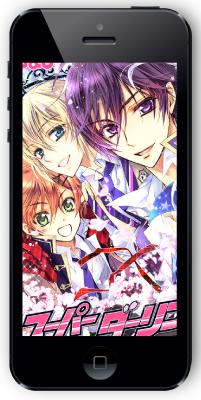The New York Times this week ran an article (accompanied by a video) titled "Comic Books Zap to Life" that recommends three digital comics apps: comiXology's Comics, the Dark Horse app, and Manga Rock. That last one is problematic, although writer Kit Eaton gives it a rave review:
Manga Rock, free on iOS and Android, beats the competition. It has a list of more than 50,000 comics available, and though its reading system isn’t as sophisticated as the one in Comics, it is still smooth to use. It’s free, but to get access to all the comics you have to pay $4 for the full edition through an in-app upgrade.
Here's why Manga Rock is such a good deal: It's a reader that uses files from pirate manga sites. When you open the app, it allows you to choose three sources for your manga; all three are bootleg sites that host scanlations (fan translations) and sometimes scans of licensed books. I checked a couple of series that are licensed in the United States on both the app and one of the websites it's pulling from. The manga isn't actually available on the website (there's a note saying that's because it's licensed), but many of these series are available via the app, so the files are still sitting on the server somewhere.
Eaton recommends two other manga apps, apparently without trying them; both are also bootleg apps that work in exactly the same way.
The article brings up a couple of interesting points about the problem of manga piracy. One is how easy it is to be fooled. Manga Rock looks professional, and it's available via iTunes, which we think of as a pretty tightly controlled environment. How can this be? I won't pretend to understand the inner workings of the Apple app store, but it's worth pointing out that these apps are really just download managers that point to certain websites (unlike comiXology and Dark Horse, which host the comics on their own servers). The app itself doesn't contain the content, just as, for instance, many pirate sites don't host the actual material, they just point you to where you can get it.
At the same time, Manga Rock, as deplorable as it may be from a legal and ethical standpoint, gives the customers exactly what they want: lots of manga, from a variety of publishers, for free or for just a few bucks. It's really hard for publishers to compete with that, because they have to pay their creators and their employees. This is a huge problem for the manga industry, especially as a large part of the audience is teenagers, who have the time and interest to read a whole series from start to finish but usually don't have the money to pay for it. Add to that the fact that publisher-specific apps only offer a limited selection, and some creators won't let their manga be published digitally (although it happens anyway on the scan sites), and you end up with a significant edge for the bootleg apps.
U.S. publishers understand the problem very well, and the digital manga scene here has evolved quite a bit. The most promising entry is Crunchyroll's digital manga service, which offers a handful of popular titles, with the most current chapters available for free and some back issues for a price. There are more digital manga services on the horizon, but as long as serious outlets like The New York Times can't (or won't) make the distinction between a legitimate manga app and a bootleg app like Manga Rock, the publishers will continue to have an uphill climb.


